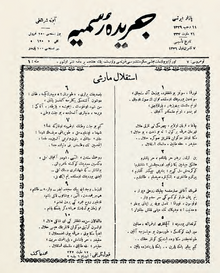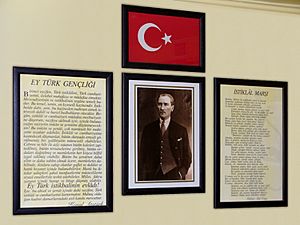İstiklal Marşı facts for kids

Dated copy of the original text that was released on March 21, 1921
|
|
| National anthem of | Turkey and Northern Cyprus |
|---|---|
| Lyrics | Mehmet Akif Ersoy, 1921 |
| Music | Osman Zeki Üngör (composer) Edgar Manas (orchestration) |
| Adopted | 1921 – Turkey 1938 – Hatay State 1983 – Northern Cyprus |
The İstiklâl Marşı (meaning "Independence March") is the national anthem of both Turkey and the Turkish Republic of Northern Cyprus. It was officially chosen by the Grand National Assembly (Turkey's Parliament) on March 12, 1921. This was two and a half years before the country of Turkey was officially founded in 1923.
The anthem was created to inspire soldiers fighting in the Turkish War of Independence. It also served as a song of hope for the new country that was about to be formed. The words were written by Mehmet Âkif Ersoy, and the music was composed by Osman Zeki Üngör.
The song is about love for the Turkish homeland, freedom, and faith. It also praises important ideas like hope, dedication, and making sacrifices for liberty. These ideas are shown through images related to the flag, the human spirit, and the land itself. Ersoy's original writing was dedicated "To our Heroic Army," honoring the soldiers who fought for independence.
You can often hear the İstiklâl Marşı during official government and military events. It is also played during national holidays, sports events, and school ceremonies. In Turkish schools, a framed copy of the anthem is usually displayed in classrooms, along with the Turkish flag and a picture of Mustafa Kemal Atatürk, the founder of Turkey.
In 1983, the Turkish Republic of Northern Cyprus also adopted the İstiklâl Marşı as its national anthem.
History of the Anthem
The İstiklâl Marşı came about through the efforts of many poets and musicians over several years. This happened during a difficult time in Turkish history.
In 1921, during the Turkish War of Independence, a competition was held to find a national march. This was organized by the Turkish National Movement, a group led by Mustafa Kemal Atatürk. They were fighting for independence against foreign powers and the old Ottoman Empire government. The goal was to find a song that would motivate the soldiers and inspire pride for a new homeland.
Many poems were submitted, 724 in total. Mehmet Akif Ersoy, a famous poet, at first did not want to join because there was a money prize. However, the National Parliament convinced him to submit his poem without taking the reward.
Ersoy's ten-stanza poem was read to the Parliament on March 1, 1921. The members of Parliament liked it very much and chose it unanimously. The prize money was later given to a group that helps veterans.
After the poem was chosen, another competition was held to find the best music for it. Twenty-four composers took part. In 1924, the music composed by Ali Rıfat Çağatay was chosen.
However, Çağatay's music was only used for six years. In 1930, a new musical arrangement by Osman Zeki Üngör was adopted. Üngör was a talented composer and the first conductor of Turkey's Presidential Symphony Orchestra. Later, in 1932, a famous composer named Edgar Manas was asked to make the music sound even better. This final version is the one we hear today.
Lyrics of the İstiklâl Marşı
The Turkish national anthem has ten stanzas, but usually only the first two stanzas are sung during official events. These first two parts are shown below in modern Turkish and their English translation.
| Current lyrics in modern standard Turkish | English translated version |
|---|---|
|
I Korkma! Sönmez bu şafaklarda yüzen al sancak, Sönmeden yurdumun üstünde tüten en son ocak. O benim milletimin yıldızıdır, parlayacak; O benimdir, o benim milletimindir ancak. II Çatma, kurban olayım, çehreni ey nazlı hilal! Kahraman ırkıma bir gül; ne bu şiddet, bu celal? Sana olmaz dökülen kanlarımız sonra helal... Hakkıdır, Hakk’a tapan milletimin istiklal! |
I |
Images for kids
See also
 In Spanish: İstiklâl Marşı para niños
In Spanish: İstiklâl Marşı para niños
 | Leon Lynch |
 | Milton P. Webster |
 | Ferdinand Smith |




